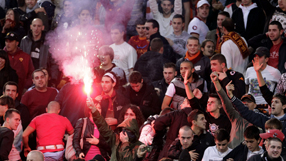
The best features, fun and footballing quizzes, straight to your inbox every week.
You are now subscribed
Your newsletter sign-up was successful
Want to add more newsletters?

Five times a week
FourFourTwo Daily
Fantastic football content straight to your inbox! From the latest transfer news, quizzes, videos, features and interviews with the biggest names in the game, plus lots more.

Once a week
...And it’s LIVE!
Sign up to our FREE live football newsletter, tracking all of the biggest games available to watch on the device of your choice. Never miss a kick-off!
Join the club
Get full access to premium articles, exclusive features and a growing list of member rewards.
The fan card, which had initially sparked protests from supporters groups, was conceived following a series of violent incidents at Serie A matches in 2007 when a policeman was killed after a Sicilian derby and a Lazio fan was shot dead.
Roberto Maroni, minister of the interior, predicted the 'tessera per il tifoso', or members card, would foster a family atmosphere as he made the removal of fences a priority.
Casual supporters can still buy tickets for one-off matches without having a fan card but most supporters will need them.
"Before the end of next season we want to take away all the fences and other barriers that box in fans," he told reporters after a meeting with football officials. "Stadiums should be places for celebration and not where you get hit.
"We want to bring true supporters together, those that support their team and not the ones who come to football to break the heads of the opposing fans."
Italy's mainly working class 'ultra' fans have traditionally had considerable influence within clubs with their low-cost positions behind the goals, the 'curva', often spectacularly decked out with team colours and elaborate messages.
But the recent spate of violence in and around Serie A's sometimes crumbling and often half-empty stadiums has led to a drastic rethink on how the game should attract new fans.
The best features, fun and footballing quizzes, straight to your inbox every week.
Giancarlo Abete, head of the Italian football federation, said the removal of barriers from grounds would bring Italy closer to UEFA's 'philosophy' for European football stadiums.
"We need more functional stadiums and a new rapport with fans," he said. "Now we need a concerted effort to overcome any negative perceptions about the supporters card. It will be both efficient and functional."
NEXT STEP
The next step, along the lines of English football's post-Hillsborough transformation following the 1989 stadium disaster in which 96 fans died, will be the construction of new 'club-owned' stadiums, a measure that has been held up in parliament.
"We just need to make sure the bill does not interfere with TV rights," said Abete. "When it is eventually passed, it will be a significant act for Italian football. Italy's football future must involve rebuilding stadiums."
After the heyday of the 1980s and 1990s, Italian clubs can no longer punch their weight with the top Premier League teams or Spanish giants Real Madrid and Barcelona in the transfer market with a corresponding drop in performances on the pitch.
Inter Milan may have won the Champions League in 2010 but no Serie A side made the last four this year, a trend that means the Italian team that finishes fourth next season will no longer compete in Europe's top competition.
Unlike other top European leagues, Serie A clubs rent stadiums with many - like Inter and AC Milan, Roma and Lazio - sharing grounds owned and maintained by the city council.
However, next season Juventus, Italy's most popular team, will become the first club to play at their own home after constructing a 41,000-seater stadium.
 Join The Club
Join The Club










